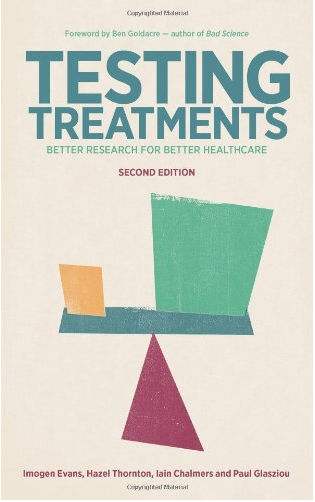
The present book is the Persian translation of the book "Testing Treatments: Better Research for Better Healthcare". The authors and consultants of this book are Imogen Evans, a medical doctor and former researcher and journalist, Hazel Thornton, a patient and independent lay advocate for quality in research and healthcare, and Iain Chalmers, and Paul Glasziou, a general practitioner and researcher. They are all members of the medical community and are also affiliated with the Cochrane.
This book, is translated and published into Persian by the Cochrane Iran Associate Center, was inspired by a question: ‘How do you ensure that research into medical treatments best meets the needs of patients?
Modern medicine has been hugely successful. It is hard to imagine what life must have been like without antibiotics. The development of other effective drugs has revolutionized the treatment of heart attacks and high blood pressure and has transformed the lives of many people with schizophrenia. Childhood immunization has made polio and diphtheria distant memories in most countries, and artificial joints have helped countless people to be less troubled by pain and disability. Modern imaging techniques such as ultrasound, computed tomography (CT), and magnetic resonance imaging (MRI) have helped to ensure that patients are accurately diagnosed and receive the right treatment. The diagnosis of many types of cancer used to spell a death sentence, whereas today patients regularly live with their cancers instead of dying from them. And HIV/AIDS has largely changed from a swift killer into a chronic (long-lasting) disease.
But the triumphs of modern medicine can easily lead us to overlook many of its ongoing problems. Even today, too much medical decision-making is based on poor evidence. There are still too many medical treatments that harm patients, some that are of little or no proven benefit, and others that are worthwhile but are not used enough. How can this be, when every year, studies into the effects of treatments generate a mountain of results? Sadly, the evidence is often unreliable and, moreover, much of the research that is done does not address the questions that patients need answered.
The most that research can usually do is to chip away at the uncertainties. Treatments can be harmful as well as helpful. Good, well-conducted research can indicate the probability (or likelihood) that a treatment for a health problem will lead to benefit or harm by comparing it with another treatment or no treatment at all. Since there are always uncertainties it helps if we try to avoid the temptation to see things in black and white. With enough reliable information, patients and health professionals can then work together to assess the balance between the benefits and harms of treatments. They can then choose the option that is likely to be most appropriate according to individual circumstances and patient preferences.
Our aim in Testing Treatments is to improve communication and boost confidence, not to undermine patients’ trust in health professionals. But this can only happen when patients can help themselves and their health professionals critically assess treatment options.
We authors are committed to the principle of equitable access to effective healthcare that is responsive to people’s needs. This social responsibility in turn depends on reliable and accessible information about the effects of tests and treatments derived from sound research. Because healthcare resources everywhere are limited, treatments must be based on robust evidence and used efficiently and fairly if the whole population is to stand a chance of benefiting from medical advances. It is irresponsible to waste precious resources on treatments that are of little benefit, or to throw away, without good reason, opportunities for evaluating treatments about which too little is known. Fair testing of treatments is therefore fundamentally important to enable equitable treatment choices for all of us.
We hope that you, the reader, will emerge from Testing Treatments sharing some of our passion for the subject and go on to ask awkward questions about treatments, identify gaps in medical knowledge, and get involved in research to find answers for the benefit of yourself and everybody else.
Chapter 1. New – but is it better?
Chapter 2. Hoped-for effects that don’t materialize
Chapter 3. More is not necessarily better
Chapter 4. Earlier is not necessarily better
Chapter 5. Dealing with uncertainty about the effects of treatments
Chapter 6. Fair tests of treatments
Chapter 7. Taking account of the play of chance
Chapter 8. Assessing all the relevant, reliable evidence
Chapter 9. Regulating tests of treatments: help or hindrance?
Chapter 10. Research – good, bad and unnecessary
Chapter 11. Getting the right research done is everybody’s business
Chapter 12. So what makes for better healthcare?
Chapter 13. Research for the right reasons: blueprint for a better future
